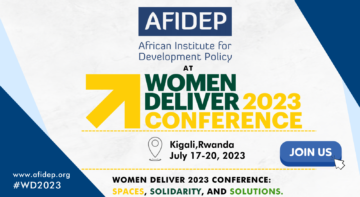News

During the second half of 2011, AFIDEP launched three policy-targeted projects that seek to generate evidence to guide efforts to address the high levels of unmet need for family planning, reduce the huge inequities in child health and wellbeing, and promote integration of population dynamics and climate change in Africa.
1. Assessment of Drivers of Progress in Increasing Contraceptive use in sub-Saharan Africa
Despite the general poor performance in meeting unmet need for family planning and other reproductive health services in sub-Saharan Africa, a few countries have beaten the odds and recorded good progress in increasing contraceptive use in the recent past. However, these positive experiences have not been systematically assessed, documented and effectively disseminated to propel similar progress in other countries in the region. This project fills this knowledge gap by carrying out systematic policy and program audits to determine factors that have propelled Rwanda, Malawi and Ethiopia to achieve the relatively impressive gains in contraceptive use over the last decade. In addition, the study will investigate the stall in contraceptive use in Tanzania and Kenya, and what prompted the recent re-emergence of family planning progress. The project is co-funded by UNFPA-Africa Regional Office and the David and Lucille Packard Foundation.
2. Population Dynamics, Climate Change and Sustainable Development in sub-Saharan Africa
Despite the growing recognition of the role of population factors in environmental sustainability and the capacity of countries to adapt to consequences of climate change, policies and programs addressing these issues continue to be largely vertical. The overall purpose of this project is to increase awareness of the synergies across these issues among policy makers, and enhance integration of population dynamics, climate change adaptation, and sustainable development policies and programs in sub-Saharan Africa. The project has two components:
- Regional analysis and mapping to depict relationships between demographic dynamics and climate change, and identify population and climate hotspots which are defined as countries or regions of rapid population growth, low resilience to climate change, high projected decline in food production and food security, faced with water shortages;
- Carry out similar analyses in greater detail, as well as policy and program audits in Kenya and Malawi in order to identify opportunities for enhancing the integration of population dynamics, the environment and climate change in the two countries. Lessons from the project will inform the development of a broader regional study examining these issues. The project is co-funded by Population Action International (PAI) and AFIDEP and jointly implemented by the two institutions.
3. Assessing determinants of child deprivation and drivers of progress in addressing inequities in child wellbeing in East and Southern Africa
Despite increased emphasis on equity-oriented analysis and programming, available analyses do not have strong program value as they do not go far enough in providing real-time indicators of vulnerability that intervention programs can use for proper targeting. Additionally, most measures of inequity focus on specific diseases and health outcomes, which deflects attention from examining the child as a whole whose wellbeing and deprivation are affected by multiple diseases, service oriented factors, household and community circumstances. The purpose of this project is therefore to assess and address child deprivation using a multi-dimensional indicator and assess the determinants and efforts to reduce child deprivation in Eastern and Southern Africa. The study has two components:
- Secondary analysis of quantitative data sets to determine levels, trends and drivers of deprivation and vulnerability to inequity, and
- Review of program efforts that countries in the region have designed and implemented since UNICEF’s equity re-focus agenda launch in 2007. This review will help identify good practices in reducing inequities in child health and wellbeing. The evidence generated from the project, funded by the UNICEF Eastern and Southern Africa Regional Office, will be used to enhance equity-oriented policies and programs in the region.
Related Posts





